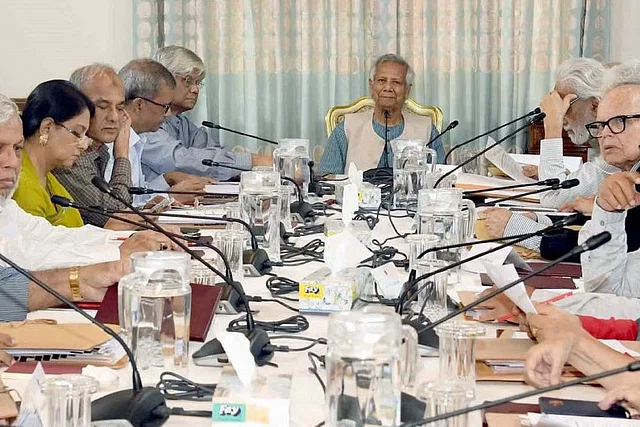After the fall of Sheikh Hasina’s autocratic regime through the student-people uprising, the interim government led by Dr. Yunus took office on August 8. This government came to power at a time when years of authoritarian rule had left the country’s institutions nearly destroyed, law and order in disarray, and the economy devastated by corruption and political patronage.
On the other hand, with the end of autocratic rule, the people have awakened with great hopes and enthusiasm for reforming the state and rebuilding the economy to establish an equitable, democratic Bangladesh.
As a representative of the hopes and aspirations of the uprising students and the public, the interim government faces enormous expectations, which are being voiced regularly in various meetings, seminars, rallies, processions, media writings, and social media discussions.
Although one month is a very short time to judge how capable the interim government is in fulfilling the people’s high expectations, some signs of the government’s orientation toward these hopes and aspirations can be glimpsed through its various statements, actions, and plans during this period.
This article attempts to evaluate the government’s activities, steps, and plans over the past month. It highlights the positive actions taken by the government while also noting the areas where actions have fallen short, where attention has yet to be focused, or where there appear to be deficiencies.
Positive Actions by the Government:
- Inviting the UN Human Rights Office to conduct an independent and impartial investigation into the July and August killings.
- Initiating the creation of a comprehensive list of martyrs and the injured, alongside a foundation for long-term medical care for the injured and support for the families of the martyrs.
- Reorganizing the boards of directors of banks to free them from the control of large loan defaulters and looting business groups.
- Compiling a list of 150 influential figures involved in corruption and money laundering, and starting investigations against 79 of them, including major business groups like S. Alam, Beximco, Bashundhara, and influential ministers, MPs, bureaucrats, police officers, and businessmen from the Sheikh Hasina regime.
- Abolishing the provision allowing undeclared wealth, or “black money,” to be whitened by paying 15% income tax.
- Suspending all ongoing activities under the controversial Quick Enhancement of Electricity and Energy Supply (Special Provisions) Act, 2010 (amended in 2021).
- Deciding not to increase electricity and gas prices without public hearings or executive orders.
- Reevaluating projects undertaken for political purposes or those currently under review by the Executive Committee of the National Economic Council (ECNEC).
- Signing the International Convention for the Protection of All Persons from Enforced Disappearance and establishing a commission to investigate disappearances that occurred during the previous government.
- Forming a committee to prepare a white paper on the overall economic situation of the country.
- Forming a national committee to review contracts made under the Quick Enhancement of Electricity and Energy Supply Act during the Awami League government.
- Establishing a committee of experts to reform the healthcare system, improve the quality of medical services, and strengthen the healthcare structure.
- Ensuring a free environment for the media to operate and urging the press to actively point out government mistakes, as called for by the chief advisor.
- Deciding to launch the metro rail at the earliest possible time and operate it on Fridays as well.
- Lodging a strong protest with India over the killing of a Bangladeshi teenager, Shorna Das, by Indian Border Security Force (BSF) near the Kulaura border in Moulvibazar.
- Pressuring India to discuss unresolved issues, including the long-pending Teesta River water-sharing agreement, based on international law regarding cross-border rivers.
Where Gaps and Deficiencies Remain:
- Despite the government’s promise to take full responsibility for the medical care of those injured during the mass uprising, many are still unable to afford treatment.
- The investigation process for the July killings has not been made clear, and the identification, arrest, and prosecution of the perpetrators and those who ordered the killings are not yet visible.
- Extortion in various sectors—such as transportation, roads, sidewalks, markets, garbage collection, and sand extraction—has merely shifted from one group to another, with no visible efforts to curb the extortion itself.
- The government has failed to control the prices of essential commodities, including rice. There is no clear initiative to ensure the supply of goods in the market, break the market syndicate, or provide essential items at affordable prices for low-income people.
- In government institutions, the influence of one party has simply replaced another, with widespread promotions, including for officials proven to be corrupt.
- The law and order situation remains unstable, with mob justice incidents occurring frequently, and institutions such as educational and healthcare facilities are being pressured into forced resignations, hampering their ability to function.
- In response to some students’ protests, the HSC and equivalent exams have been canceled.
- The criteria and process for filling vacant positions in various institutions are unclear, leading to suspicions of politically motivated and questionable appointments.
- The government failed to take timely action to prevent looting and arson at the Gazi Tire factory, leaving hundreds of people missing.
- Several notorious criminals, identified as top criminals, have been released from prison without a clear process or standard.
- Announced attacks on various shrines are being carried out, but no government action has been taken to prevent them.
- The government has not yet taken any initiative to hold accountable those responsible for mass surveillance and wiretapping of citizens for political purposes.
- Although the government has talked about reforms in the police, judiciary, administration, and election commission, it has not made the reform process clear, nor has it provided a timeline or roadmap.
The presence of these shortcomings in the interim government’s activities does not mean that the government is unwilling or unable to correct them. As stated earlier, one month is not enough time to meet the enormous expectations of the people. Moreover, it is not easy to effectively implement any action through institutions devastated by years of autocratic rule. However, the focus and priorities of the government are crucial.
It is essential to recognize that it is impossible for this government to clear up 15 years of accumulated problems in a short time. The most important task is to set clear priorities and develop specific time-bound plans. We hope the government will learn from the positive and negative experiences of the past month and move forward with renewed determination toward laying the foundation for an equitable and democratic Bangladesh.
Kallol Mustafa, writer and researcher










